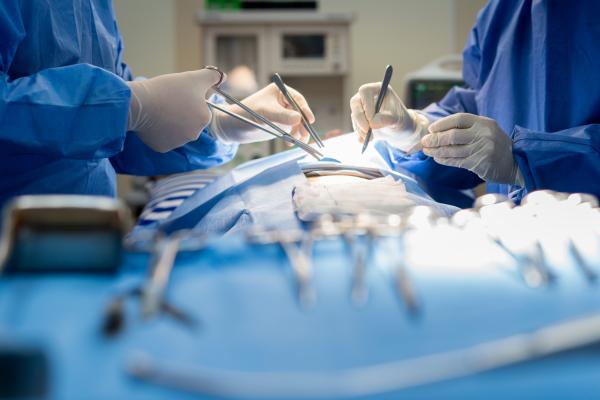How do I access surgery or endoscopy services?
Your healthcare provider may refer you to a specialist / surgeon to determine if surgery or endoscopy is needed or could help with an illness, condition or injury.
Many patients will be referred using Nova Scotia’s new eReferral tool. Patients who provide their email address can receive automatic email updates as information is added in the tool. When it comes time for an appointment, you may even have the option to confirm your appointment right from your email.
Patients being referred in the eReferral tool can ask their healthcare provider to note their preferences. This might include a certain facility or healthcare provider, or noting that you would be willing to travel to some other areas, or anywhere in the province, if it meant receiving care sooner. Please think about these options. It is important to remember that you may also need to travel to see the specialist for an appointment, for your surgery / procedure and for other care that may be needed before and after your procedure.
Surgeon / specialist offices book patients for an appointment to determine if a surgery / procedure, or other types of care, may be needed. At this appointment, your surgeon / specialist will discuss options with you to help you understand the benefits, risks and what is involved. Once a decision is made to go ahead with a surgery / procedure, you will be added to a wait list based on need.
Most surgeries or endoscopies are not considered emergencies and can be safely scheduled for a future date. These are sometimes referred to as elective surgeries or procedures and will be scheduled based on the priority level assigned by the surgeon or specialist.
Other surgeries may be considered to be urgent or an emergency and will occur quite quickly, sometimes the same day or within a matter of days.
How quickly you are scheduled for surgery / endoscopy will depend on how urgently you require care and how many other patients are waiting.
Most scheduled (elective) surgery or endoscopy patients are provided with a surgery date a few weeks ahead of their surgery.
Nova Scotia Health booking teams help support the scheduling process. Learn more.
Information on surgical wait times can be found on the Nova Scotia Wait Times website: waittimes.novascotia.ca
You should contact your surgeon or primary health care provider if your condition changes or becomes worse while you are waiting.
How do I prepare for my surgery?
Your surgeon will let you know of any steps you need to take to prepare for your surgery.
- Medications and Supplements
- Some patients may be directed to stop taking certain medications or supplements before surgery. It is important for your health care team to know any medications or supplements you are taking.
- Testing
- Depending on the type of surgery you are having, and your overall health, tests testing such as blood-work or x-rays may be ordered before your surgery.
- Clinics
- You may also need to take part in other clinics to help you get ready for surgery, including:
- Physiotherapy
- You may be encouraged to take part in physical therapy to build strength before your surgery or to help with your recovery. A referral may be required to access these services in hospital or through a private clinic.
- Equipment
- Your health care team will advise if you need to arrange for certain equipment to help with your recovery.
It is important that patients know what to expect and feel they have all the information they need about their surgery. We recommend that you make a list of questions to ask your health care team.
Will I have to stay in hospital after my surgery?
The vast majority of surgeries are completed as outpatient surgery. This means that you arrive at the hospital the day of your surgery and return home later that same day.
Other surgeries require a hospital stay. These are known as inpatient surgeries. How long you will stay in hospital depends on the surgery you are having, your overall health, and how quickly you recover after your surgery.
Some patients will be admitted prior to the day of their surgery while other will be admitted the same day. This depends on the surgery you are having, your overall health and if any tests needs to happen prior to your surgery.
Your health care team will talk to you about what to expect.
What can I expect on the day of my surgery?
Your health care team will provide you with instructions and let you know what to expect. What happens the day of surgery can vary between locations and based on the surgery you are having.
Most patients can expect the following:
- You will be told where to register when you come for surgery.
- You will need to show your Nova Scotia Health Card and to confirm your insurance information.
- You will be asked to leave all your valuables at home or leave these with whoever may be accompanying you.
- If you are having day surgery, you may need to have someone available to drive you home after the surgery. Staff will ask who is driving you and how they can be reached.
- From the registration area you will be directed to the surgery department to prepare for your surgery.
- You will be asked to change into hospital clothing and slippers.
- A nurse will ask you some questions, including when you last ate and drank.
- A nurse may also take your weight and height and check other things such as your temperature or blood sugar levels.
- After your procedure you will be moved to recovery room.
What can I expect after my surgery?
Your health care team will talk to you about what to expect after surgery and the things you can do to support your recovery.
This might include telling you what side effects might be common, any activities to avoid, how to control pain, how can you help your recovery, signs of infection or other complications to watch for, and where you should call if you have a concern.
Questions you might want to ask your health care team include:
- What possible side effects should I look for after treatment?
- What are the signs of infection?
- What do I do about constipation?
- What kind of timeframe am I looking at for recovery?
- What activities am I allowed to do? What should I avoid?
- What medications am I allowed to take?
- Can I drive?
- Can I travel?
- Can I drink alcohol?
- Will I have a follow-up appointment?
National Surgical Quality Improvement Program
Through this program, registered nurses (surgical clinical nurse reviewers), collect information from patients after their surgery. This helps us look for areas in surgical care that can be improved.
One of our nurses may call you 30 days after your surgery to have a short discussion about your recovery from your procedure. Your participation is voluntary and can help us improve surgical care for our patients.




